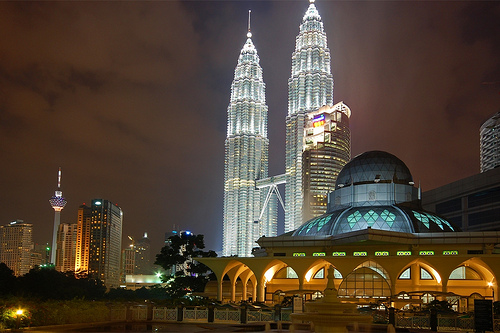
In a rather widely reported move, PAS, the conservative Islamic opposition party that rules several states in northern Malaysia, recently launched a publicly distributed ‘Islamic currency’ in Kelantan state. The gold and silver coins, worth $180 and $4 respectively, will be used in transactions by 1,000 outlets in the state and will become, so the eager authorities say, an optional means of payment for civil servant salaries and a currency for the payment of Islamic alms, or Zakat. The state government also announced that gold bars would be issued for bigger investments and that coins worth $630,000 had sold out on the first days of trading.
The CEO of Kelantan Golden Trade, the state company in charge of implementing the currency reform stated that: “The arrival of these coins mark the end of 100-year old Darurah [extreme necessity for a Muslim] of tolerating the injustice of paper money, from now on Darurah is over, at least for people in Kelantan.”
Never mind the practicalities of hauling around heavy pieces of gold and silver (a commentary in Malaysia’s most popular daily, The Star, suggested, rather facetiously, that people should start carrying around bags or pouches for the coins), the political implications, particularly the deafening silence on the part of the Malaysian federal government and the central bank, are striking.
While competition over the Islamic credentials of Malaysia’s leadership has in many ways defined the development of the modern Malaysian state in tandem with an ambitious push to modernize, the move threatens to bring ethnic and religious cleavages back to center stage in a country that teeters on the edge of communal discord, even violence, and that tries, with success but also with great strain, to balance the interests of the Muslims Malays with those of ethnic Chinese and Indians.
This move has, once again, raised the stakes between PAS and UMNO, the more moderate ruling party, in the battle to prove their Islamic credentials. Interestingly, however, federal authorities have remained almost totally silent on the topic, simply announcing that a competing currency would not be tolerated and that the legal tender of the country would continue to be the ringgit. Although Kelantan state authorities have stated that the new currency is not intended to replace the ringgit and is a currency for barter trade, the scale and symbolic significance of this launch is unprecedented.
The federal government’s reaction is telling: It indicates that the federal government wishes to downplay the importance of this launch and is hoping that the initiative will crumble under its own weight and unenforceability. By not reacting strongly, they hope that the challenge to the federal government will fizzle out, leaving PAS worn down and isolated. But they also cannot outright condemn the move because it is in fact something the former prime minister Mahathir Mohammad advocated, and it would put the government in an awkward position of condemning something that, in a historical sense at least, is traditionally Islamic.
But as Malaysia’s second poorest state gears up to embrace the currency of the revered caliphates of the past, the federal authorites seem eager to move Malaysia even faster into the future. A month before this launch the central bank issued its commemorative coin for 2010, featuring the image of a high speed train in celebration of the state rail company. Its imagery and symbolism could not have been more appropriate for the battle that continues to define modern Malaysia: How to merge a powerful religious legacy with a multiethnic and modern future.

